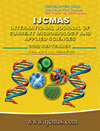


 National Academy of Agricultural Sciences (NAAS)
National Academy of Agricultural Sciences (NAAS)

|
PRINT ISSN : 2319-7692
Online ISSN : 2319-7706 Issues : 12 per year Publisher : Excellent Publishers Email : editorijcmas@gmail.com / submit@ijcmas.com Editor-in-chief: Dr.M.Prakash Index Copernicus ICV 2018: 95.39 NAAS RATING 2020: 5.38 |
Clove leaf essential oil is a volatile compound, unstable to heat, light and air. Clove leaf essential oil can be prepared in microemulsion (o/w) preparations to maintain stability and aplicable in food. The purpose of this study was to obtain a microemulsion formulation of clove leaf essential oil (o/w) with good stability. The nonionic surfactants used consisted of Tween 20, Span 80 and Tween 80. This research was carried out in 2 stages. The first stage consisted of a mixture of surfactant ratios (Tween 20, Span 80 and Tween 80) with 5 treatment levels, namely (98:2:0), (98:0:2), (98:0,5:1.5), (98:1,5:0,5), and (98:1:1). The second stage consisted of the ratio of clove leaf essential oil and the ratio of surfactants selected in the first stage which consisted of 8 levels, namely (15:85), (17.5:82,5), (20:80), (22.5: 77.5), (25:75), (27.5:72,5), (30:70), and (32.5:67,5). Stability test was carried out on centrifugation force, heating, pH, and dilution with turbidity index parameters. The turbidity index value was below 1% and the transparent appearance was declared as a stable microemulsion. The results showed that the ratio of the mixture of nonionic surfactants (98: 0.5: 1.5) was the best result with the characteristic turbidity index value before testing 0.181±0.007%, after centrifugation 0.188±0.004% and after heating 0.215±0.013%. Meanwhile, the ratio of clove leaf essential oil to surfactant 22.5:77.5 was the best result with a transparent appearance, the turbidity index value before testing was 0.214±0.013%, after centrifugation was 0.225±0.013% and after heating was 0.268±0.012%. The clove essential oil microemulsion was stable at pH (3.5; 4.5; 5.5) and dilution (1:1, 1:9, 1:99). The size of the clove leaf essential oil microemulsion droplets formed 2 peaks, namely peak 1 of 93% with an average size of 35.4 nm and peak 2 of 7% with an average size of 2759.3 nm with a polydispersity index value of 0.420. The clove essential oil microemulsion had an average zeta potential value of 0.1 mV. Clove leaf essential oil was stable for 8 weeks of storage.
 |
 |
 |
 |
 |